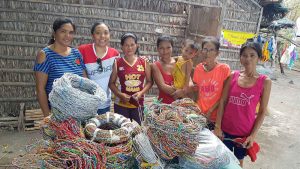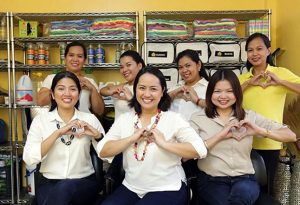Leading figure in the Philippines’ social enterprise space, Professor Carlo Sagun of Bayan Innovation Group, and Asia Value Advisors’ founder Philo Alto, share how engaging the philanthropy sector and corporations can help social enterprises move the country towards meeting the UN Sustainable Development Goals (SDGs).
In the past six years there has been an increase in efforts to strengthen the social enterprise ecosystem in the Philippines. This has been led by the Ayala Group of Companies working with us at Bayan Family of Foundations, alongside other leaders in the space to move things forward. It’s an important time to grow investment in businesses focused on social and environmental outcomes in order to help the Philippines work towards meeting the SDGs. Social enterprises (SEs) are uniquely placed to do this and we are glad to see work to help them grow.
Social investment in the Philippines
We are hoping that support from major businesses and philanthropic investment in this space continues to flourish and advance the social enterprise sector to help us meet the goals. There has been a good start with some important investments into the space. Since 2017 there’s been a modest USD $1 million (Php 58.4M) investment into the sector by the Bank of the Philippine Islands (BPI) Foundation (the foundation of BPI whose largest shareholder is Ayala Corporation). This has helped us at Bayan Family of Foundations to offer social enterprise bootcamps and grants, and, importantly, to develop a ‘National Social Enterprise Development Roadmap’. It means we have more direction as a sector. And, it has brought other supporters in to the space too.
Ayala Corporation is the oldest and one of the largest conglomerates in the Philippines. It was founded in 1834 by the Ayala family. It is a huge presence in the Philippines with core interests in real estate (ie Ayala Land, Inc.), banking (ie. Bank of the Philippine Islands), telecommunications and financial technologies (ie Globe Telecom), and renewable energy (ie AC Energy), among others. So far, it’s been instrumental in working with us to bring organisations together for positive social change.
Helping Philippines’ social enterprise thrive
BPI Foundation commissioned us at Bayan Academy (one of the foundations within Bayan Family of Foundations, an ecosystem of Philippine-based NGOs that specialise in the development of social enterprises) to train social enterprise leaders and offer them the chance to pitch projects that would scale their businesses and social impacts. The most promising social enterprises were awarded grants of up to USD $9,000 (Php 0.5m). Two examples of social enterprises which have thrived and continued to scale up after their participation in this capacity building program are Junknot and Happy Helpers.
Junknot works to solve two problems that the Philippine society is facing – waste management and lack of livelihood. It finds creative ways to transform regular plastic waste into functional furniture pieces and, in the process, provides additional income for its beneficiary communities and protects the environment.
After winning the grant, Junknot founder Willie Garcia, was inspired to strengthen the business further and took a master’s degree in social enterprise development in Ateneo de Manila University’s Graduate School of Business (where Carlo Sagun is a professor). She credits the learnings from this master’s program as instrumental to Junknot’s current performance, which is already internationally recognised.
The enterprise’s award winning furniture set, Anak ng Tupa (Sheep’s Child), is a collection dedicated to the number of sheep in the Garcia farm that died from eating plastic waste while grazing.
Happy Helpers, a home cleaning service, has also expanded since the programme. The business is dedicated to helping reduce mess in people’s lives so they can focus on what matters most to them. Through its collaboration with its marginalised community partners, it realises its mission to uplift and empower Filipinos through life coaching, skills training, and meaningful work. As with Junknot, founder Maan Sicam also pursued her master’s degree in social enterprise development in Ateneo. She is now also a board trustee of the Philippines’ Society for the Advancement of Professional Social Entrepreneurship (SAPSE).
With the success of the bootcamps and witnessing social enteprises thriving, key stakeholders in the areas of positive social and environmental change, such as the Philippine Cooperative Center, Asian Solidarity Economy Council and De La Salle University’s Lasallian Social Enterprise for Economic Development Program, were inspired to back the growth of social enterprise further and to create a plan of action around this.
National Social Enterprise Development Roadmap
With this in mind, Bayan Innovation Group was commissioned by BPI Foundation to conduct research on the state of the Philippines’ social enterprise sector. This served as critical input to the eventual development of the National Social Enterprise Development Roadmap (SE Roadmap). We can see clearly how strategies and action programmes within the roadmap has been important to unify the sector towards putting its efforts into growing the scope, size, and SDG contribution of Philippine social enterprises.
Another important development has been the involvement of BPI’s micro-finance subsidiary, BPI BanKo, founded in 2016. Its products include NegosyoKo Loan (or MyBusiness Loan) which asks for 2.3 – 2.5 per cent monthly interest for a term between six and 36 months. BPI BanKo also has a loan product for smallholder farmers with a collective repayment rate lower than market rate. In addition, it offers a savings account which has a 5% (higher than average) interest rate, depending on how much is deposited. This offers social enterprises the investment they need to grow.
Supporting financial inclusivity for micro enterprises
According to its 2022 annual report, BPI BanKo had more than USD $397m in assets dedicated to its mission of providing affordable financial solutions for Filipinos, particularly micro and small enterprises, including social enterprises. More recently, especially since its involvement in the SE Roadmap, BPI BanKo has expressed to us its aim to make its products more accessible for Philippine social enterprises to help in the sector’s financial inclusivity.
We have also seen how the SE Roadmap serves as an opportunity for organisations which offer grants and loans for social enterprises, to realise their core purpose and increase their scope. This includes organisations such as the Peace and Equity Foundation (more than USD $38.9m in asset size in 2022) and First Community Cooperative (more than USD $318.2m in asset size in 2022).
These organisations, along with actors from the Ayala Group of Companies and others mentioned in this article are now part of the National SE Roadmap Council (54 members in total). We are all working together for healthy growth in the social enterprise space, so that the Philippines can have a better chance of meeting the SDGs.
In 2017, Ayala Corporation also co-founded the Global Compact Network Philippines, the local entity of the UN Global Compact that advances collaboration and innovation for the SDGs. This has now grown from just a few organisations to 51 large companies all collaborating towards the sustainability agenda.
Encouraging philanthropy in Philippines’ social enterprises
We look forward to sharing more of these efforts to develop Philippine social enterprises at the first Philippine SE Roadmap Council Conference on 27 – 28 November 2023 in Manila, Philippines. The event will be a convergence of all the SE Roadmap’s leaders, so that strategic collaborations can be strengthened towards building the capacities of Philippine social enterprises.
Ayala Corporation’s chairperson for its sustainability and risk committee, Fernando Zobel de Ayala, will welcome the session on the ‘Engagement of Corporations and Philanthropies in the SE Roadmap as a Shared Value Proposition’. The session will be co-facilitated by Philo Alto of Asia Value Advisors and Angel Chia of Family Offices Association Hong Kong. Both will provide their perspectives on success factors for growing the involvement of local and regional family offices and next generation philanthropies in impact advocacies.
It’s hoped that the session will provide an opportunity for stakeholders within the Philippines and across the region to learn from each other’s journey in investing in social enterprise development.
Carlo Sagun is Executive Director of Bayan Innovation Group in the Philippines. He co-led the development of the national social enterprise development roadmap and co-authored the book How to Manage a Business That Does Good, A guidebook for social entrepreneurs to deepen their business and social impact.
Philo Alto is Founder and CEO of Asia Value Advisors, a philanthropic capital advisory firm, based in Hong Kong. He is also a member of the Bayan Innovation Group board, and global editorial advisory board member of Alliance magazine.




Comments (0)
The emphasis on maintaining accountability towards donors and the civil society organisations receiving funding is a sensible strategy that acknowledges the need for responsibility in several directions.